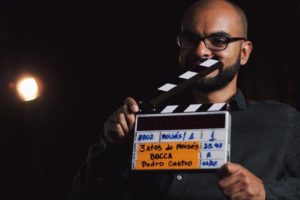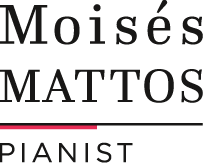… Pires once said to Moisés: ‘In two years you have achieved what others usually learn in seven years through hard work’.
 Documentary ‘Moisés in 3 Acts’
Documentary ‘Moisés in 3 Acts’
Currently a documentary about the life of the pianist Moisés Mattos is being produced with the German title: ‘Moisés in 3 Akten’ (Moisés in 3 Acts).
The aim of this project is to show how the pianist tells stories through music, how the stories’ universal language connects cultures and inspires us to follow our dreams.
Moisés Natividade de Matto’s unusual way to become a pianist
By Martin Hofmann*
The Brazilian taught himself piano, now he is studying at the University of the Arts (Hochschule für Künste) Bremen and is playing a charity concert for his disabled sister at a church in Hamburg (Christuskirche Othmarschen).
In his community in Brazil he was not allowed to play the organ– boys do not do that, they said. That’s why Moises first took violin lessons in his mother’s church. But his fascination with the organ did not go away. At the age of eight he watched a concert with Vladimir Horowitz on TV. Since then he has dreamt of becoming a pianist. But a piano was unaffordable for the family Natividade de Mattos. They live in Juiz de Fora, in the southeast of Brazil. Even the essentials were missing: food, clothing, furniture. The father used to be a security guard, the mother is unemployed; neither can read or write. Moisés sister Samara was born with severe Down syndrome. This background is no fertile ground for music and art.
But at least Moisés was allowed to play the violin at church. When no one saw him he secretly went back to the organ and practised, until one day a security guard caught him out. But the guard liked the music. Moisés was allowed to continue that day. So he kept going to his violin lessons in order to secretly play the organ. Once again he got caught and this time it was finally over with playing the organ. However, his passion for it remained strong.
At the age of twelve Moisés draws a keyboard on the table and practices imaginary keys. Later on an aunt lends him an electric toy piano with only one octave. He imagines the rest of the keys.
Moisés’ father Paulo Roberto is impressed by the determination of his boy. Despite great financial difficulties the family buys a keyboard with four octaves. Moisés wants to learn more and more. Soon the four octaves are no longer enough.
At the age of thirteen he sets out to find a ‘real piano’: he discovers a conservatory in Juiz de For a where he walks for two hours up and down the hills in the Brazilian heat. The cleaning ladies and guards take a liking to the boy and smuggle him into the building late at night. For the first time in his life Moisés plays on a ‘real piano’.
Again he gets caught: The director throws him out, but Moisés sneaks in again. But some teachers and students are critical and tell him, ‘You’ll never become a pianist.’ But there are others too: they encourage the self-taught boy to approach Professor André Pires who is known as a great master pianist throughout Brazil. Moisés auditions for him.
Professor Pires is impressed by his talent and his self-taught skills. He agrees to teach him on a trial basis for three months. In these three months they work on a ballad by Chopin, for which other piano students would usually need two years. The three months’ trial turns into three and a half years. Three and a half years turn into a friendship. Pires once said to Moisés: ‘In two years you have achieved what others usually learn in seven years through hard work.’
To finance himself Moisés works in a cosmetics shop. One day he hears music from a neighbouring building. He rings the bell and meets the German Veronika Brunis who hires him for her eurythmy course and advises him to go to Germany to improve his piano playing. Moisés learns German within three months. A participant of Veronika Brunis’ course pays for the flight to Hamburg. An old friend of hers offers to put him up. He is lucky and meets the Brazilian pianist Ivone Bambirra who prepares him for the entrance examination for the university; the Meinecke family looks after his well-being.
Moisés is now twenty-five and is studying piano at the University of the Arts (Hochschule für Künste) in Bremen in his third year. His lifelong dream is to be able to earn enough through his music to support not only himself but also his family in Juiz de Fora. Especially his disabled sister Samara needs help.
* The author is a pastor at Christuskirche Othmarschen.
The article is edited (in relation to the event information) and published with the kind permission of the author. (German article)[/vc_column_text][/vc_column]
[/vc_row]
